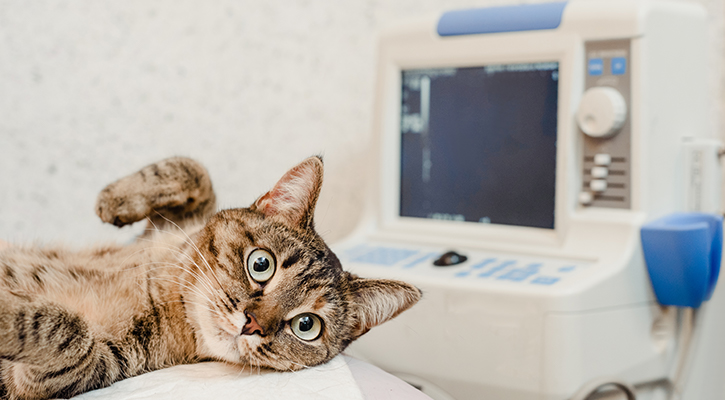
Cat Diagnostic Imaging
Real-Time Ultrasound Imagine For Accurate Veterinary Diagnostics
Ultrasound imaging is a veterinary diagnostic tool that uses high-frequency sound waves to produce real-time images of your pet’s internal systems. Painless and non-invasive, it offers a high degree of clarity when examining your critter companion’s organ, muscle, and bone functions. Often used in conjunction with digital X-rays, ultrasound technology aids our veterinarians in diagnosing and treating your feline or canine family member.
Abdominal Ultrasound
Abdominal ultrasound simplifies the diagnosis of internal disease by providing veterinarians with a clear view of the patient’s stomach, liver, kidneys, and other internal organs. The real-time capabilities of ultrasound technology allow our veterinarians to diagnose and assess a variety of veterinary conditions including:
- Liver disease
- Kidney disease
- Urinary bladder disease or kidney stones
- Pregnancy
- Enlarged lymph nodes and cancer
- Abdominal masses, fluid, and foreign material
- Pancreatitis and inflammatory bowel disease
Should a mass be discovered during an ultrasound, the board-certified specialist will enlist the help of our veterinarians and certified staff to use anesthesia during the remainder of the ultrasound. This ensures our patient is comfortably asleep while we pass an ultrasound-guided needle directly into the mass. This is done to collect (or aspirate) a small tissue sample, which will be used to properly identify the mass. This option is infinitely less invasive than a surgical procedure that would otherwise be required to collect this kind of diagnostic tissue sample.
Cardiac Ultrasound
Cardiac ultrasound, also known as echocardiogram or ECHO, can be especially useful when detecting heart problems. Abnormalities in the motion of the heart valves, blood flow through the heart, chamber size, and contractions of the heart muscle can be assessed for abnormalities with a high degree of accuracy. Assessing the heart as it beats is crucial for treating and diagnosing specific heart diseases.
Cardiac ultrasound is used to diagnose and identify:
- Cardiac birth defects
- Diseases of the heart valves
- Heart muscle diseases (cardiomyopathy)
- Fluid around the heart (pericardial effusion)
- Cardiac tumors
- Certain types of heartworm infections
An echocardiogram is a highly effective, safe technique for diagnosing heart disease in pets. If you think your pet might need an echocardiogram, contact Carpenter Animal Hospital and Pet Inn. We are one of the area’s few non-specialty practices to offer this service in-house.
Echocardiogram
An echocardiogram is a non-invasive technique that a vet can use to assess the condition of your pet’s heart. It is the same test and imaging done in people with heart conditions.
An echocardiogram uses high-frequency sound waves to create live images of the inside and outside of the heart, allowing the vet to see what the heart looks like and how it’s functioning in real time. Your vet can see:
- How big the heart is
- The shape of the heart
- How thick the walls of the heart are
- How well the heart is pumping
- Whether there are any abnormal blood flow patterns or possible blood clots
- Whether there are any abnormalities in the pericardium or valves
- Whether any areas of the heart are damaged
To perform an echocardiogram, vets typically hold a probe against the skin overlying your pet’s heart. The probe sends sound waves to the heart, which appear as images on a screen.
Echocardiograms are usually painless and safe to perform on almost any pet. While sedation is not always necessary, your vet may use it to ensure your pet is still for the duration of the procedure. Minimal movement helps your vet get the clearest images. Some patients may also need small areas of chest hair shaved to capture the best images.
Should My Pet Get an Echocardiogram?
Heart disease is a serious condition in dogs and cats. Factors like age, breed and diet can affect your pet’s chance of developing heart disease. An echocardiogram provides more insight into your pet’s condition, helping us determine the best treatment options.
We recommend echocardiograms for patients with a heart murmur, arrhythmia or suspicion of heart disease. If your pet displays any of the following symptoms, scheduling an echocardiogram could help identify whether a heart issue is causing the problem:
- Difficulty breathing
- Loss of appetite
- Weight loss
- Bluish tinge to skin or gums
- Heart murmur
- Lethargy
- Fainting or sudden collapse
- Hind leg paralysis in cats
In-House Laboratory
has the capability to perform various blood screens, pre-anesthetic bloodwork, urinalysis and other types of testing on-site instead of sending samples to an outside lab.
Testing provided in the hospital includes:
- Liver enzyme screening
- Pancreatic evaluation
- Renal (Kidney) profiles
- Complete blood counts
- General chemistries
- Blood gases
- FelV, FIV in cats
- Parvovirus in dogs
Contact Us For Cat Radiographs Today
If you are concerned that your cat might be injured or experiencing internal problems, or you’d like to discuss how feline radiographs can benefit your precious pet, please schedule an appointment with one of our veterinarians today.
Call our Denver office at 303-757-5638 or our Centennial office at 303-843-7222, or fill out our online scheduling form, to schedule an appointment for your cat.
Explore Our Complete List of Veterinary Services in Denver, CO & Centennial, CO
- Senior Cat Care
- Kitten Care
- Cat Vaccinations
- Cat Surgery
- Cat Spaying & Neutering
- Cat Nutrition
- Cat Microchipping
- Cat Laser Therapy
- Cat Laparoscopic Surgery
- Cat Lab Tests
- Cat Dental
- Cat Cardiology
- Cat Cancer
- Anesthesia & Patient Monitoring
- Puppy Care
- Dog Lab Tests
- Heartworm Prevention
- Parasite Prevention
- Cancer Referrals
- Dentistry
- Wellness Care for Cats
- Wellness Care for Dogs
- Dog Laser Therapy
- Acupuncture
- Dog Spay & Neuter
- Dog Vaccinations
- Exotic and Avian Care
- Dog Dental Care
- Dog Nutrition
- Dog Surgery
- Digital Radiology
- Dog Diagnostic Imaging
- Senior Dog Care
- Dog Microchipping
- Emergency Veterinary Care
